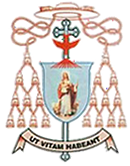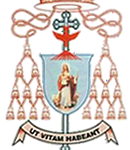- +234 9070497007
- info@archbishopvalokeke.org
INTRODUCTION:
1. Gratitude:
We give thanks to God for his merciful love. By his grace, we are able to once
again reflect on a major aspect of our faith as Catholic Christians, – namely, The
Holy Spirit. To God be all glory and never-ending praise forever. Again, we are
ever grateful to you my dear family of God in the Archdiocese of Onitsha and all
men and women of goodwill for the joyful reception which my past Pastoral
Letters have enjoyed among you. May the contents of these letters continue to
draw us closer to God and aid our journey through time to our true home in God’s
kingdom.
2. NOTION AND IDENTITY OF THE HOLY SPIRIT
The Person or identity of the Holy Spirit remains an enigma, thereby difficult to
understand. In the Bible, many symbols and images are used to describe the Holy
Spirit. These images include: wind, fire, cloud, water, oil, breath and light. Such
may explain why some think of the Holy Spirit as a powerful influence available
for our use at various times, or a power we plug into when we are in need or more
still, a power we invoke against our enemies. For example, “Holy Ghost…
!..Fire!” has become a popular slogan inviting the Holy Spirit to destroy one’s
enemies. But the Holy Spirit is not a mere power or influence. It is not a negative
force nor a weapon against our enemies.
In fact, the Holy Spirit is a Divine Person, the third person of the Most Blessed
Trinity. He is worthy of our filial trust. He deserves to receive our love, adoration
and worship just like Jesus and God the Father. He is the Paraclete (that is a
helper) and the advocate (that is one who pleads the cause of another before a
tribunal or a judicial court), the one promised by Jesus whom the Father will send
to us. Hence, He says, “I will ask the Father, and He will give you another
‘advocate’ to help you and be with you forever…” (John 14: 16-17).
3. Consequently, the Holy Spirit is a person whom we can trust. He is a friend,
a helper, a defender. He may not be clear in our mental picture/mental concept
like God the Son whom we know through the incarnation or God the Father whom
we know through the concept of human Fatherhood. Nevertheless, when we begin
to see the Holy Spirit as a person in his own right who wants to be in relationship
with us the process of transforming our lives can begin. (cf. Charles Whitehead,
An Invitation to the Spirit, p. 21).
4. In the Nicene Creed we pray, “I believe in the Holy Spirit, the Lord, the giver
of life, who proceeds from the Father and the Son, who with the Father and the
Son is adored and glorified, who has spoken through the prophets”. All these
show that the Holy Spirit has an identity, he is a person like the Father and the
Son. Like them He is worshipped and glorified. But God the Holy Spirit does not
seem so much like a person to us. When the New Testament depicts him as a dove
that descended from heaven during Jesus’ baptism (Matt. 3:16) or as tongues of
fire resting on the disciples on the day of Pentecost (Acts 2: 1- 4), these images
make it more difficult for us to understand and relate with the Holy Spirit as a
Divine Person, the way we relate with the Father and the Son.
Before we can have a personal relationship with the Holy Spirit, we need first of
all to know the Holy Spirit. A frequent source of error about the work of the Holy
Spirit is the attempt to study and understand his work without first of all knowing
him as a person. It is important from the standpoint of worship that we decide
whether the Holy Spirit is a Divine Person, worthy to receive our adoration, our
faith, our love and our filial surrender or whether it is simply an influence
emanating from God or a power or an illumination that God imparts upon us. If
the Holy Spirit is a Divine Being and we do not know him as such, then we are
robbing a Divine being of the worship due to him.
Given that many have only theoretical knowledge without personal relationship
with the Holy Spirit, the aim of this pastoral letter is to offer reflections that will
foster deeper understanding and intimate relationship with the Holy Spirit.
5. MOTIVATION AND CHOICE OF TOPIC:
The office of a Bishop places a great responsibility on the recipients, which is at
once ennobling, demanding, edifying, also involving sacrifices and consolations.
Reflecting on the mystery of this sacrament and the eternal realities associated
with the office, I come to the inescapable and irrevocable conclusion that it is the
grace of God and the power of the Holy Spirit truly at work. The more I think
about this ministry, the clearer the ever-present assistance of the Holy Spirit
looms large, both in the background and in the foreground.
6. Therefore, in this 20th year of our Episcopacy, as we carry on the ministry of
teaching, leading and sanctifying the people of God entrusted to our pastoral care,
we have found it necessary to reflect on the Holy Spirit. Given that the Holy Spirit
is the principal agent of evangelization and the power for ministry, we humbly
recognize his role as we appreciate the fact that our ministry has been unfolding
in His power as the Uncreated Grace. It is a recognition that our ministry
continues to unfold in the power of grace. The emphasis on the primacy of grace
in our ministry inspires and motivates us to remind our faithful that Christian life
becomes a mirage outside the power of the Holy Spirit. In truth, there is
practically no authentic Christianity outside the grace of God.
The Choice of the topic stems more from the realization that the entire Christian
life is driven by the Holy Spirit added to the recognition of man’s absolute
dependance on the power of God’s grace.
It is my burning desire to reflect on this topic, to eliminate some mistaken notions
of the Spirit, clarify his indisputable role in salvation history so that the faithful
can develop a personal relationship with the Holy Spirit, who, as a person, is
“Man’s Helper and Friend”.


